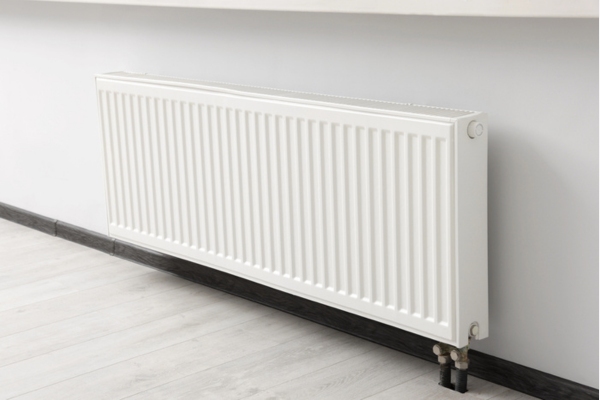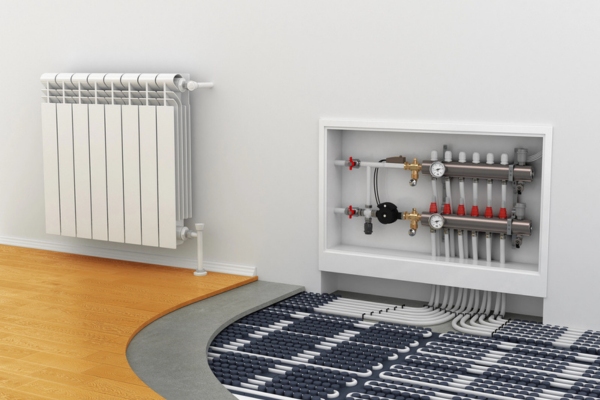Hydronic Vs. Forced Air Heating: Key Differences Every Homeowner Should Know

A reliable heating system is vital in keeping homes warm and livable through winter. Among the most commonly used systems are forced air and hydronic heating, offering distinct performance features and benefits. Understanding how these systems function and what they offer can help homeowners make informed choices that enhance comfort, improve efficiency, and support better cost management over time.
McAllister Energy, a dependable HVAC company serving Southern New Jersey, provides knowledgeable support and skilled installation services to help homeowners select and care for the most suitable home heating system. In this article, we’ll explore forced air vs hydronic heating systems, highlighting their distinctions and shared qualities.
Choose McAllister Energy for Reliable Home Heating: Keep your home comfortable and energy-efficient with trusted heating services from McAllister Energy. Get in touch with us today!
Forced Air vs. Hydronic Heating: A Detailed Guide to Choosing the Right System for Your Home
Contents
- 1 Forced Air vs. Hydronic Heating: A Detailed Guide to Choosing the Right System for Your Home
- 2 Understanding Forced Air Heating Systems
- 3 Basics of a Hydronic Heating System
- 4 Important Considerations When Deciding Between Forced Air and Hydronic Heating
- 5 Forced Air vs Hydronic Heating Systems: Frequently Asked Questions
- 5.1 What Maintenance Is Needed Each Year for Forced Air and Hydronic Systems?
- 5.2 Can a Forced Air System Be Converted to Hydronic Heating?
- 5.3 How Do Forced Air and Hydronic Heating Systems Affect Indoor Humidity?
- 5.4 Can Forced Air and Hydronic Heating Systems Be Zoned?
- 5.5 Which Heating System Performs Better in Cold Weather?
- 6 Final Thoughts: Selecting the Best Heating System for Your Home
- 7 Contact McAllister Energy for Premier HVAC Services

Recognizing the distinctions between forced air and hydronic heating systems is vital when selecting the most effective heating option for your household. Both systems offer unique qualities that influence energy efficiency, indoor comfort, and operating costs. By evaluating their features, advantages, and drawbacks, you’ll be better equipped to identify the heating solution that suits your home’s specific requirements and overall comfort goals.
Turn to McAllister Energy for Expert Heating Solutions: Maintain consistent warmth and lower energy use at home with professional heating services from McAllister Energy. Call us now!
Understanding Forced Air Heating Systems
Forced air heating systems use a central furnace to warm air and circulate it through the space using a network of ducts and vents. These systems can work on various energy sources, including natural gas, electricity, or heating oil, each providing different efficiency ratings and fuel availability.
The process begins with the system pulling in cooler air, which is then heated inside the furnace. A blower fan then distributes the warmed air through the ductwork, delivering heat to each room in the house.
Benefits of Choosing Forced Air Heating

- Fast Warm-Up Time: These systems quickly heat indoor spaces by rapidly warming air in the furnace and sending it through ducts, delivering comfort with minimal delay.
- Dual-Purpose Ductwork: Existing ductwork used for heating can also be utilized for central air conditioning, reducing overall HVAC costs and streamlining system design.
- Improved Indoor Air Quality: As air circulates, it passes through filters that trap allergens, dust, and other particles, promoting cleaner and healthier indoor environments.
- Lower Initial Cost: Forced air systems are generally more budget-friendly to install, particularly in homes already equipped with ductwork, reducing setup time and expenses.
Rely on McAllister Energy for Quality Heating Services: Keep your home comfortable and running efficiently with expert solutions from McAllister Energy. Contact us today!
Drawbacks of Forced Air Heating
- Operational Noise: These systems may generate noticeable sounds from the blower and airflow through ducts, which can affect the quietness of certain rooms.
- Uneven Temperature Distribution: Problems like duct leaks or obstructions can result in inconsistent heating, creating warm and cool spots throughout the house.
- Ongoing Upkeep Requirements: To ensure reliable performance, forced air systems need routine care such as filter replacements and duct inspections; skipping maintenance can reduce efficiency and comfort.
Basics of a Hydronic Heating System

Hydronic heating systems use hot water or steam to circulate heat across a home, distributing warmth through radiators, baseboard units, or tubing beneath the floors. These systems include options like radiant floor heating, which provides even heat rising from below, and baseboard heating, which warms rooms using units installed along the walls.
Trust McAllister Energy for Complete Heating Solutions: Experience reliable comfort and improved efficiency with expert heating services from McAllister Energy. Call us today!
Benefits of Hydronic Heating Systems
- Consistent Warmth: Hydronic heating delivers steady, even temperatures throughout the home, helping to eliminate cold zones and temperature swings.
- Quiet Operation: These systems heat without blowing air, resulting in a virtually silent experience that enhances indoor comfort.
- High Energy Efficiency: Radiant floor and other hydronic setups often consume less energy while maintaining cozy temperatures, helping to lower utility bills.
- Health-Friendly Air Quality: Without circulating air, hydronic heating reduces the movement of dust and allergens, making it a great option for allergy-sensitive households.
Limitations of Hydronic Heating Systems
- Delayed Warm-Up: Hydronic systems heat more gradually since warmth is delivered through heated water or steam rather than quickly circulated air.Lacks Cooling Capability: These systems are designed only for heating and cannot provide air conditioning without adding ductwork and a separate cooling unit.
- Costly Installation: The upfront expense for hydronic systems, especially radiant floor heating, tends to be higher and may involve significant retrofitting in older homes.
Choose McAllister Energy for Trusted Heating Solutions: Enjoy dependable comfort and energy efficiency with expert services from McAllister Energy. Contact us today!
Important Considerations When Deciding Between Forced Air and Hydronic Heating

Choosing the right heating system involves weighing several critical factors to achieve the best balance of energy efficiency, comfort, and performance in your home.
- Energy Usage and Efficiency: Forced air systems can be less efficient because heat loss from leaks in ductwork may lead to higher energy use. In contrast, hydronic systems are often more energy-efficient, especially radiant heating setups, as they retain and distribute warmth more effectively with lower energy consumption.
- Home Layout and Installation Demands: Hydronic systems are typically better suited for new builds or large-scale renovations because they require more involved installation. Forced air systems are often easier and less expensive to add in existing homes that already have ductwork in place.
- Air Quality Impact: Since forced air systems move air through ducts, they can spread dust and allergens unless filters and components are cleaned regularly. Hydronic heating doesn’t rely on air movement, making it a healthier alternative for those with asthma, allergies, or other respiratory conditions.
- Cost of Heating Systems: Forced air systems usually have a lower initial installation cost, particularly in properties with ductwork. However, hydronic heating may provide greater long-term value through decreased energy usage and fewer maintenance requirements over the system’s lifespan.
- Comfort Considerations for Homeowners: Preferences for features such as silent operation, even heat distribution, and whether or not air is circulated throughout the home can be key in determining which heating system best aligns with a household’s comfort expectations.
Rely on McAllister Energy for Expert Heating Services: Enjoy steady comfort and improved efficiency with customized heating solutions from McAllister Energy. Call today!
Forced Air vs Hydronic Heating Systems: Frequently Asked Questions

What Maintenance Is Needed Each Year for Forced Air and Hydronic Systems?
Forced air heating systems need consistent upkeep, including switching out air filters every 1 to 3 months, periodic duct cleaning, and an annual furnace inspection. In comparison, hydronic systems typically demand less routine attention. However, they should still be checked yearly for boiler performance, pump and valve function, and any potential issues with pressure or leaks.
Can a Forced Air System Be Converted to Hydronic Heating?
Yes, but switching from a forced air system to hydronic heating can be complicated and expensive. The process requires removing existing ductwork, installing new piping, and setting up radiators or radiant floor heating systems. This type of conversion is typically more feasible during major home renovations or when building new construction.
How Do Forced Air and Hydronic Heating Systems Affect Indoor Humidity?
Forced air heating systems often reduce indoor humidity, particularly during the winter months, which may lead to the need for a humidifier. Hydronic heating systems, in contrast, do not blow air through the home and have no impact on humidity, making them a better option for preserving stable indoor moisture levels.
Partner with McAllister Energy for Superior Heating Services: Keep your home warm and energy-smart throughout the seasons with trusted solutions from McAllister Energy. Get in touch with us today!
Can Forced Air and Hydronic Heating Systems Be Zoned?
Yes, zoning is possible with both heating systems, though the methods vary. Forced air systems use dampers within the ductwork to regulate airflow to specific home areas. Hydronic systems achieve zoning more easily by setting up individual piping loops for different rooms or sections, which allows for more precise temperature control.
Which Heating System Performs Better in Cold Weather?
Hydronic heating systems are generally more reliable and effective in frigid climates, offering steady and consistent warmth. Forced air systems may face challenges in freezing conditions due to heat loss through ductwork, often requiring additional energy to keep indoor temperatures comfortable.
Final Thoughts: Selecting the Best Heating System for Your Home
Deciding between forced air and hydronic heating comes down to what fits your home’s layout and personal comfort priorities. Forced air systems heat quickly, are typically more affordable to install, and can support heating and cooling, though they may create noise and uneven temperatures. Hydronic systems deliver quiet, uniform warmth with better energy efficiency, though they come with a higher upfront cost and slower heating response.
Working with a trusted HVAC provider like McAllister Energy gives you access to expert guidance tailored to your home’s unique needs, making it easier to choose the right heating system for long-lasting comfort and energy savings.
Choose McAllister Energy for Outstanding Heating Solutions: Maintain a warm, energy-efficient home all season long with trusted services from McAllister Energy. Contact us today!
Contact McAllister Energy for Premier HVAC Services
At McAllister Energy, we offer expert heating and cooling solutions throughout Southern New Jersey. Our team comprises professionally certified HVAC professionals specializing in system tune-ups, repairs, full installations, replacements, and more. With extensive experience and technical training, our technicians ensure your HVAC system receives the care and precision it deserves.
We are committed to providing the most budget-friendly pricing for HVAC services in Southern New Jersey. Our maintenance services improve your comfort and help reduce energy costs through increased system efficiency. McAllister Energy will help you find the ideal solution for your home and budget, whether you’re looking for a quick repair or a full system upgrade. A satisfaction guarantee backs every job we perform.
Call McAllister Energy today to book your service visit and receive a professional in-home consultation. Call now!
You can click here to contact us now or call us at (856) 665-4545 to find out more! Click the link to view our service area.

Related Articles:
- Understanding AFUE vs AFUE2: Heating Efficiency Standards Explained
- Why Supplemental Ductless Heating is Perfect for Targeted Warmth
- Why You Should Call A Professional For Your Furnace Repair
- Wall Vents Open or Closed: How Vent Adjustments Can Increase Energy Bills
- Revolutionize Comfort: Master Ceiling Fan Use For Every Season